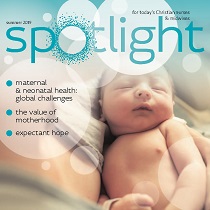I am a mother of four. During my pregnancies, I suffered from one or two complications, especially with my last pregnancy, and I valued input from health professionals. Midwives and doctors were helpful in my own maternal health, but they were absolutely crucial in my children's neonatal health - they actually saved the lives of my last two newborns.
Both my daughter, and then later my son, arrived extremely prematurely, one at 27 weeks gestational age, one at 26 weeks (and six years apart for those trying to make sense of that!) Within half an hour of birth, they'd been suctioned then ventilated, had oxygen delivered, and levels monitored. A cocktail of drugs had been given, including intravenous caffeine to stimulate breathing (my daughter blames her love of coffee on those first neonatal days!). Placed in incubators to maintain body temperature, central lines, electrodes, and cannulas in place, there was hardly any 'tech-free' part of my babies to see by the time I was allowed out of the labour room to visit them.
On both occasions, there followed a tough three months with my babies in NICU, fighting for their lives. Yet I am so grateful that I live in the UK and had access to the amazing care and free medical facilities here. It would have been a gravely different outcome for my children if they'd been born in Africa or Southeast Asia. There's such a dramatic survival gap between low-income and high-income countries for babies born before 28 weeks. A report in 2012, titled Born Too Soon: The Global Action Report on Preterm Birth (1) showed that in low-income countries, more than 90 per cent of extremely preterm babies die within the first few days of life, while less than 10 per cent die in high-income countries.
It doesn't seem fair. I felt the same last summer as I witnessed a 27 gestational week baby die on a neonatal ward in Kisiizi, Uganda, or the pair of 28-week twins the following day.
How does our Lord, the God of justice, feel about that or about the fact that 99 per cent of all maternal deaths occur in developing countries? (2)
And yet progress is being made. The United Nations' Millennium Development Goals 3 were introduced in the year 2000; a review in 2015 estimated that between 8.8 million and 17.3 million lives were saved due to faster progress on combatting child mortality, and approximately half a million due to improvements in maternal mortality.
It's a work in progress.
- Let's pray on.
- Let's keep hope alive that change can happen.
- Let's keep informed - I hope this edition of Spotlight helps highlight some of the issues.
- Let's be advocates for the best and fairest maternal and neonatal health globally.
And, finally, let's cheer on you, our wonderful midwifery colleagues, who do such an extraordinary and precious job.
Pippa
Pippa Peppiatt, CMF Head of Nursing
Pippa trained as a nurse. She has planted a church for students with her husband, set up a charity for street kids in Uganda, and has been a Friends International Student Worker.
































